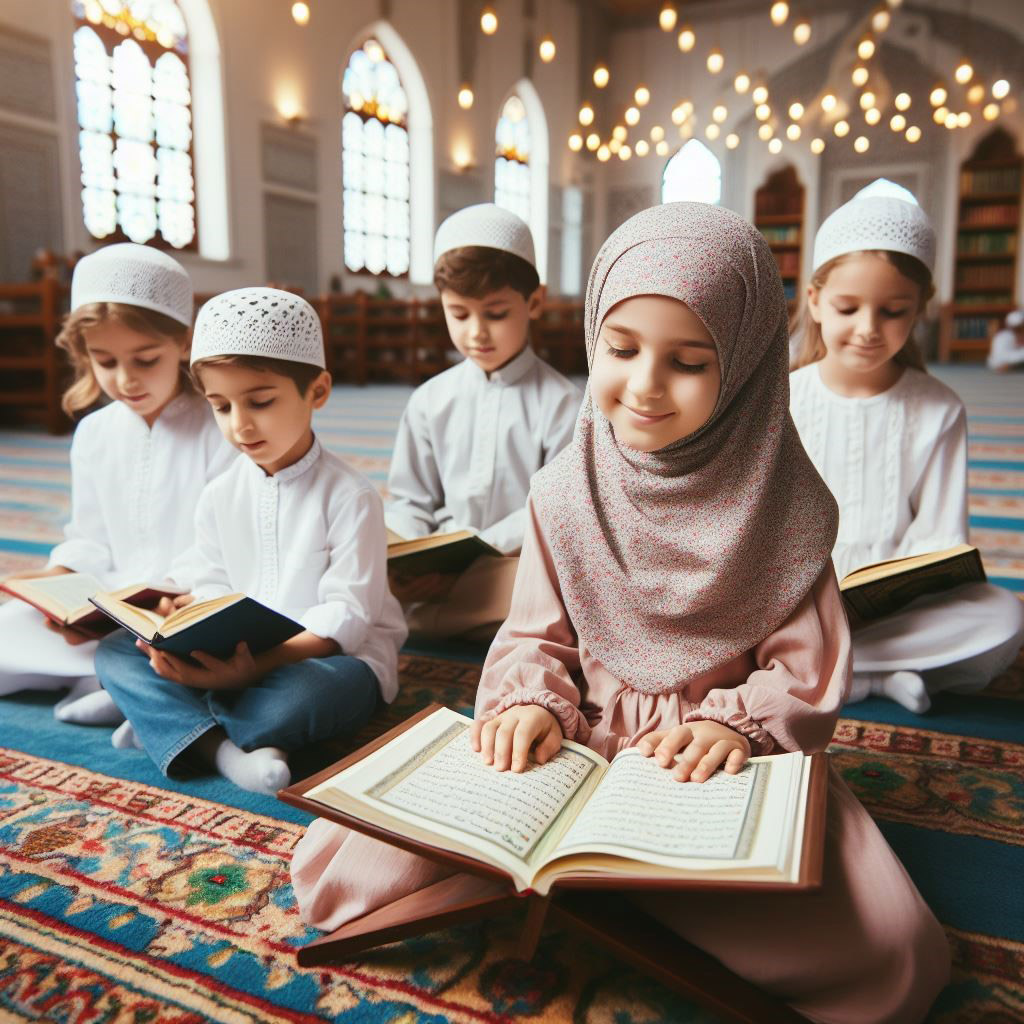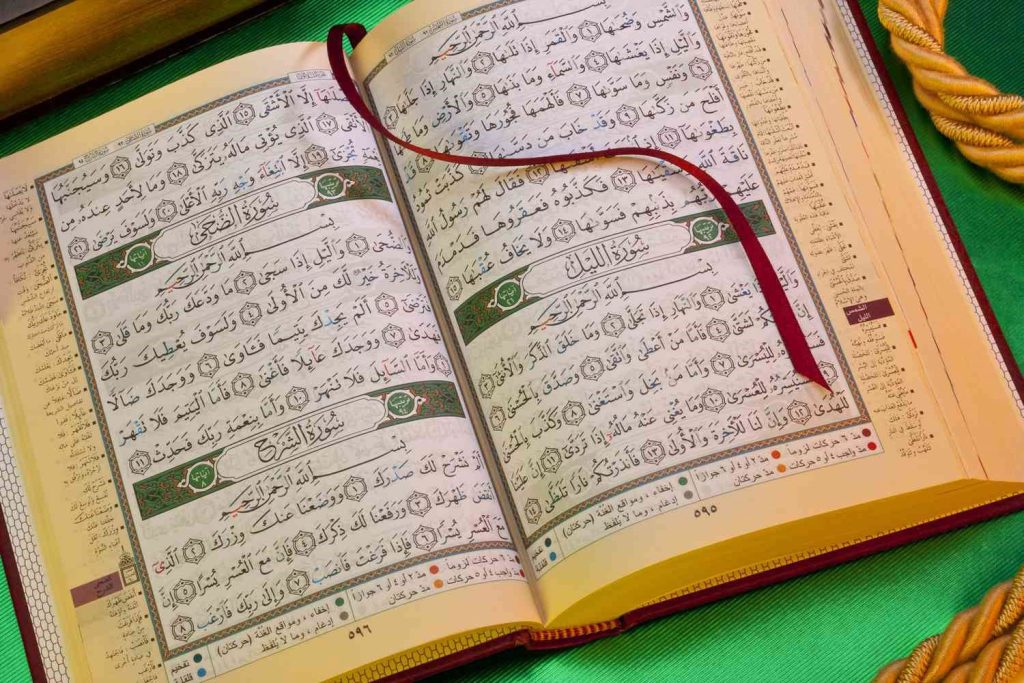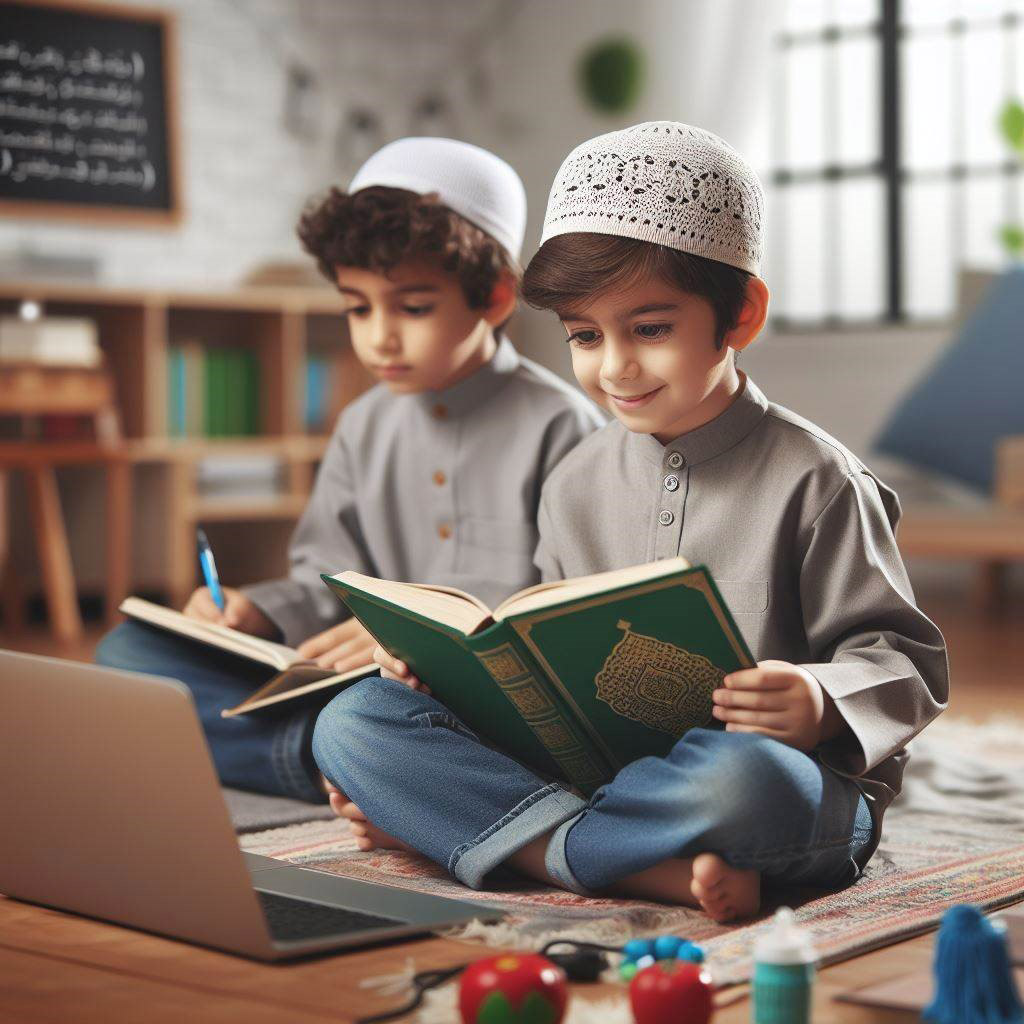The seeker of knowledge is wrapped under the blessing of Allah.
Prophet Muhammad (S)
Teaching the Sacred Quran to children at a young age lays the foundation for a strong spiritual connection and moral development. It also ensures a deep understanding of Islamic teachings, language proficiency, and emotional well-being.
Spiritual Development
Nurturing Connection
Nurturing connection through the teachings of the Holy Quran can have numerous benefits for children.
By instilling the values and teachings of the Grand Quran at a young age, children are able to develop a strong foundation of faith that will guide them throughout their lives.
Through learning and understanding the Noble Quran, children are able to develop a deep spiritual connection to their beliefs, which can provide them with a sense of purpose and direction.
Furthermore, teaching the Holy Quran to children at a young age can help instill important values such as compassion, kindness, and empathy.
The teachings of Quran emphasize the importance of treating others with respect and kindness, and by instilling these values in children from a young age, they are more likely to grow up to be compassionate and empathetic individuals.
Additionally, learning and reciting Quran can have a calming and soothing effect on children, helping them to develop a sense of inner peace and tranquility.
The rhythmic recitation of the Glorious Quran can have a meditative quality, allowing children to connect with their faith on a deeper level and find solace in the words of Allah.
Moreover, teaching Quran to children at a young age can help them develop a sense of community and connection to their faith.
By joining together with other children to learn and recite the Sacred Quran, children are able to form bonds with others who share their beliefs, creating a sense of unity and belonging within the Islamic community.
Emotional Resilience
Emotional resilience is a crucial aspect of spiritual development, and teaching the Grand Quran to kids at a young age can greatly benefit their emotional resilience.
Quran is not only a book of guidance and spiritual nourishment, but it also provides valuable lessons on coping with life’s challenges and hardships.
By instilling the teachings of the Sacred Quran in young minds, parents and educators can help cultivate emotional resilience and inner strength in children.
One of the key teachings of the Noble Quran is the importance of patience and perseverance in times of difficulty.
The Holy Quran teaches that trials and tribulations are a part of life, and one must endure them with patience and faith.
By teaching kids to recite and understand the Glorious Quran from a young age, parents and educators can help them develop the emotional resilience needed to navigate the ups and downs of life. This resilience will enable children to face setbacks and challenges with a positive attitude and a strong sense of inner strength.
Furthermore, the Noble Quran teaches the importance of trusting in Allah’s plan and surrendering to His will.
This concept of Tawakkul, or reliance on Allah, is a powerful tool for building emotional resilience.
By instilling this belief in children at a young age, parents and educators can help them develop a sense of trust and faith that will sustain them through difficult times.
This trust in a higher power can provide children with a sense of solace and security in times of crisis, helping them to remain calm and composed in the face of adversity.
Additionally, the Holy Quran emphasizes the importance of gratitude and contentment.
By teaching kids to appreciate the blessings in their lives and to be grateful for what they have, parents and educators can help them develop a positive outlook on life.
This sense of gratitude can serve as a shield against negative emotions such as jealousy and resentment, helping children to cultivate emotional resilience and inner peace.

Moral Values
Character Building
The holy Quran, the holy book of Islam, is a comprehensive guide to living a righteous and virtuous life.
It contains teachings and stories that emphasize the importance of moral values such as kindness, humility, and respect for others.
By teaching kids the Sacred Quran at a young age, parents and educators can help them to internalize these values and apply them in their daily lives.
One of the key benefits of teaching the Noble Quran to kids at a young age is that it helps to build their character.
The Grand Quran emphasizes the importance of developing good character traits such as honesty, patience, and forgiveness.
By teaching kids these values from a young age, parents and educators can help them to cultivate these traits and become better individuals.
Moreover, teaching the Holy Quran to kids at a young age helps to instill a sense of moral responsibility in them.
Quran teaches kids to be mindful of their actions and to always strive to do what is right.
By teaching kids to live by the teachings of the Glorious Quran, parents and educators are helping them to develop a strong moral compass that will guide them throughout their lives.
Furthermore, teaching the Sacred Quran to kids at a young age helps to foster a sense of empathy and compassion in them.
The Holy Quran teaches kids to be kind and caring towards others, regardless of their background or beliefs.
By emphasizing these values in their education, parents and educators can help kids to develop a sense of empathy and compassion for others, leading to a more harmonious and peaceful society.
Ethical Awareness
Ethical awareness is an essential moral value that shapes individuals’ behavior and decision-making in their daily lives.
Teaching the Sacred Quran to kids at a young age is one way to instill ethical awareness and values in them from a tender age.
The Glorious Quran is not only a religious text but also a guidebook on how to live a righteous and moral life.
By teaching children the teachings of Quran, we are setting a solid foundation for their ethical development.
When kids are taught the sacred Quran at a young age, they learn valuable lessons about honesty, integrity, compassion, and respect for others.
These moral values are crucial in shaping their character and behavior as they grow up.
By internalizing the teachings of the Quran, children learn to be kind, just, and considerate individuals who uphold high ethical standards in their interactions with others.
Furthermore, teaching the holy Quran to kids at a young age helps them develop a sense of empathy and compassion towards others.
The Grand Quran emphasizes the importance of helping those in need, being merciful towards all living beings, and treating others with kindness and respect.
By learning these values early on, children are more likely to grow up as compassionate and empathetic individuals who care about the well-being of others.
Moreover, teaching the Noble Quran to kids at a young age helps them develop a strong sense of morality and ethics.
Quran provides a clear set of guidelines on what is right and wrong, and by teaching children these guidelines, we help them understand the difference between good and bad actions.
This moral clarity enables children to make informed decisions based on ethical principles and values, leading to a more just and principled society.
In addition, teaching the Holy Quran to kids at a young age helps them develop a strong sense of spirituality and connection to a higher power.
Quran teaches children about the importance of faith, prayer, and worship, instilling in them a sense of purpose and meaning in life. This spiritual awareness helps children navigate the challenges and struggles of life with resilience and optimism, knowing that they are guided by their faith and moral values.

Knowledge and Understanding
Comprehensive Understanding
Teaching the Quran to children at a young age is a practice that has been prevalent in Islamic societies for centuries.
It is believed that instilling knowledge of the Grand Quran in children from a young age has numerous benefits, both spiritual and intellectual.
In this essay, we will explore the importance of teaching the Holy Quran to kids at a young age and how it contributes to their comprehensive understanding as knowledge and understanding.
First and foremost, teaching the holy Quran to kids at a young age helps them develop a strong foundation of faith and spirituality.
The Quran is the holy book of Islam and is believed to be the word of Allah.
By introducing children to the teachings of the Pure Quran at a young age, parents and teachers are nurturing their spiritual growth and fostering a deep connection to their faith.
This early exposure to the Holy Quran helps children develop a sense of moral values and ethics that they can carry with them throughout their lives.
Furthermore, teaching the Glorious Quran to kids at a young age helps them develop a comprehensive understanding of their religion. The Sacred Quran covers a wide range of topics, including history, ethics, and guidance for daily life.
By teaching children, Quran from a young age, parents and teachers are providing them with a strong knowledge base that will help them navigate the complexities of the modern world.
This comprehensive understanding of their religion gives children the tools they need to make informed decisions and choices in their lives.
Moreover, teaching the Sacred Quran to kids at a young age helps them develop a love for learning and a thirst for knowledge.
Quran is a rich text that is full of wisdom and guidance. By engaging children with the teachings of Quran, parents and teachers are fostering a love for learning and a curiosity about the world around them.
This early exposure to the Grand Quran instills in children a lifelong appreciation for knowledge and understanding.
Rooted in Faith
Teaching the Noble Quran to kids at a young age can help them develop a love for learning and knowledge.
The Holy Quran contains rich and profound teachings that can stimulate children’s curiosity and encourage them to seek knowledge and understanding.
By engaging with the Glorious Quran at a young age, children can develop a thirst for knowledge that will serve them well throughout their lives.
In addition to fostering a strong foundation in faith and a love for learning, teaching the Holy Quran to kids at a young age can also help them develop important values such as compassion, empathy, and humility.
The Grand Quran teaches us to treat others with kindness and respect, to care for the less fortunate, and to approach life with humility.
By internalizing these values at a young age, children can grow into compassionate and empathetic individuals who contribute positively to society.
Moreover, teaching the Glorious Quran to kids at a young age can help them develop a sense of community and belonging.
The Sacred Quran emphasizes the importance of unity and brotherhood among Muslims, encouraging us to support and care for one another.
By engaging with the Noble Quran together as a community, children can develop strong bonds with their peers and form lasting friendships based on shared values and beliefs.

Emotional Well-being
Emotional Intelligence
The Holy Quran is not just a religious text; it is a guide to living a fulfilling and ethical life. By teaching children the teachings of the Sacred Quran, parents are instilling in them important values such as compassion, resilience, empathy, and self-discipline.
One of the key benefits of teaching the Grand Quran to kids at a young age is the development of emotional intelligence.
Emotional intelligence refers to the ability to recognize, understand, and manage one’s own emotions, as well as the emotions of others. This is a crucial skill for success in both personal and professional relationships.
By learning the Heavenly Quran, children are exposed to stories and teachings that emphasize the importance of compassion, forgiveness, and self-control.
These lessons help children develop empathy and understanding towards others, as well as the ability to recognize and regulate their own emotions.
Furthermore, the Sacred Quran teaches children the importance of patience, perseverance, and gratitude.
These values help children develop resilience in the face of challenges, as well as a positive outlook on life.
In addition to emotional intelligence, teaching the Glorious Quran to kids at a young age also helps them develop a strong sense of identity and purpose.
The Pure Quran provides children with a moral compass and a sense of belonging to a larger community.
This can help them navigate the complexities of the modern world with confidence and conviction.

Resilience and Serenity
One of the key benefits of teaching the Sacred Quran to kids at a young age is the cultivation of resilience.
The Holy Quran teaches children to have faith in Allah and trust in His plan, even in the face of adversity.
This belief in a higher power helps children develop a sense of resilience, enabling them to bounce back from setbacks and obstacles with courage and determination.
By instilling this belief in children at a young age, they are better equipped to handle the challenges that life throws their way, and are able to face them with a sense of inner strength and resilience.
Additionally, teaching the Noble Quran to kids at a young age helps cultivate a sense of serenity within them.
The teachings of the Glorious Quran emphasize the importance of patience, forgiveness, and compassion, all of which are essential qualities for achieving inner peace and serenity.
By guiding children to embody these values in their daily lives, they learn to cultivate a sense of calmness and tranquility, even in the midst of chaos and turmoil.
This sense of serenity allows children to stay grounded and centered, helping them to maintain a sense of peace and balance in the face of life’s ups and downs.
Compassion and Empathy
Teaching the Heavenly Quran to kids at a young age has numerous benefits, one of which is cultivating compassion and empathy in them.
The Holy Quran is a book full of teachings that emphasize the importance of being kind, compassionate, and empathetic towards others.
By introducing children to these principles at a young age, we can help them develop these qualities early on in life.
One of the key teachings of Quran is the importance of showing compassion towards others, especially those in need.
The Sacred Quran repeatedly emphasizes the need to help the less fortunate and to be kind and generous towards those who are in need.
By teaching kids these principles, we can help them develop a sense of empathy and compassion towards others from a young age.
This can help them become more caring and empathetic individuals as they grow up.
In addition to teaching compassion, the Holy Quran also emphasizes the importance of empathy.
Empathy is the ability to understand and share the feelings of others, and it is a crucial skill for building strong relationships and fostering understanding between people.
By teaching kids to be empathetic towards others, we can help them develop strong emotional intelligence and communication skills that will serve them well throughout their lives.
Furthermore, teaching the Grand Quran to kids at a young age can also help them develop a sense of moral responsibility.
The Quran lays out clear guidelines for virtuous behavior and emphasizes the importance of being honest, kind, and just in all interactions.
By instilling these values in kids from a young age, we can help them develop a strong moral compass that will guide them in making ethical decisions throughout their lives.
In conclusion teaching the Sacred Quran to kids at a young age offers a multitude of benefits including the development of moral values a sense of identity and cognitive skills.
By introducing children to the teachings of the Grand Quran early on parents and educators can help them lay a strong foundation for a fulfilling and purposeful life rooted in faith and knowledge.


